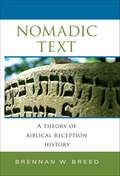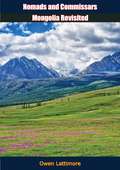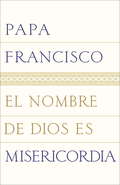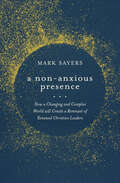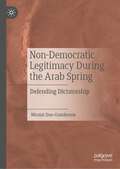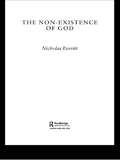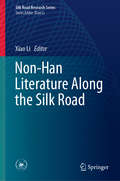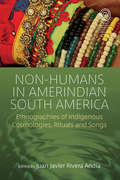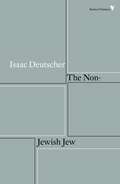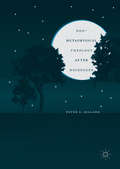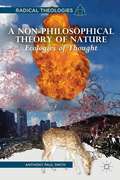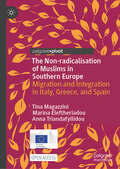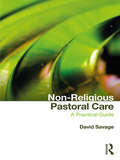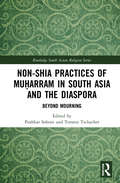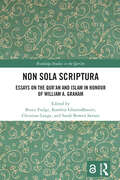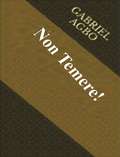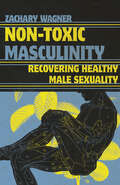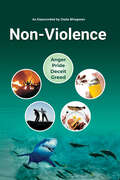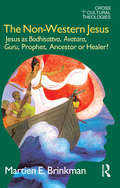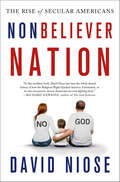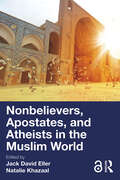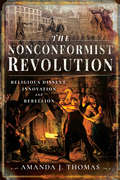- Table View
- List View
Nomadic Text: A Theory of Biblical Reception History (Biblical Literature)
by Brennan W. BreedBrennan W. Breed claims that biblical interpretation should focus on the shifting capacities of the text, viewing it as a dynamic process rather than a static product. Rather than seeking to determine the original text and its meaning, Breed proposes that scholars approach the production, transmission, and interpretation of the biblical text as interwoven elements of its overarching reception history. Grounded in the insights of contemporary literary theory, this approach alters the framing questions of interpretation from "What does this text mean?" to "What can this text do?"
Nomads and Commissars: Mongolia Revisited
by Owen LattimoreNomads and Commissars: Mongolia Revisited, which was first published in 1962, provides a lively description of modern-day Mongolia, combined with historical material.Beginning with a geographical description, author Owen Lattimore narrates Mongolian history, both political and economic. He explains how and why Marxism succeeded in a country of nomads with almost no industry, capitalists, or middle class. His chapter on the revolution focuses on the partisan leaders, Sukebator and Choibalsang, and his account of Mongolia’s past and present relations with Russia and China is especially timely in view of the difficulties being experienced between those two countries.The author was a well-respected scholar, fluent in both Chinese and Mongolian, and was well-underwritten by some of the most famous institutions in the world, who sponsored his research and Central Asian travels. Lattimore’s books, such as Inner Asian Frontiers of China (1940), are authoritative, fascinating and give keen insights to the complex relationships in Central Asia, the political forces, the cultural variations of the divergent peoples and the geography. His works are a valuable resource for areas largely neglected at the time mostly because the area was closed for such a long time.Against the odds, Lattimore won his way into Mongolia and Central Asia and did his research while traveling in the most primitive areas by the traditional camel, donkey and yak cart. He talked to the people, understood their ways and culture. His record is a valuable insight into who and what transpired during the 1920s, right through to the 1940’s.
El nombre de Dios es misericordia
by Papa FranciscoEn su primer libro oficial como el Papa, y en celebración de su Jubileo de la Misericordia, el Papa Francisco se dirige a cada hombre y mujer del planeta un diálogo íntimo y personal. En el centro, se halla el tema que más le interesa--la misericordia--desde siempre eje fundamental de su fe y ahora de su pontificado. En cada página vibra el deseo de llegar a todas aquellas almas que buscan darle un sentido a la vida, un camino de paz y de reconciliación, y una cura a las heridas físicas y espirituales. En la conversación con el vaticanista Andrea Tornielli, Francisco explica--a través de recuerdos de juventud y episodios relacionados con su experiencia como pastor--las razones por proclamar un Año Santo extraordinario. Reitera que la Iglesia no puede cerrar la puerta a nadie; por el contrario, su tarea es adentrarse en las conciencias de la gente para que puedan asumir responsabilidad por, y alejarse de, el mal realizado. Y a todos que se colocan a sí mismos en las filas de los «justos», les recuerda: «También el Papa es un hombre que necesita la misericordia de Dios». El nombre de Dios es misericordia se publica con un lanzamiento mundial en más que ochenta países.From the Trade Paperback edition.
A Non-Anxious Presence: How a Changing and Complex World will Create a Remnant of Renewed Christian Leaders
by Mark SayersFor much of recent history individuals and institutions could plan, execute, and flourish with their visions of a better world. Volatile, complex forces could be addressed and confronted with planning and management. But crisis is a great revealer. It knocks us off our thrones. It uncovers the weaknesses in our strategies and brings to light our myths and idols. Our past strategies run aground, smashed by unpredictable and chaotic waves. Yet in the midst of the chaos of a crisis comes opportunity. The history of the church tells us that crisis always precedes renewal, and the framework of renewal offers us new ways forward. A Non-Anxious Presence shows how that renewal happens and offers churches and leaders strategic ways to awaken the Church and see our culture changed for Christ.
A Non-Anxious Presence: How a Changing and Complex World will Create a Remnant of Renewed Christian Leaders
by Mark SayersFor much of recent history individuals and institutions could plan, execute, and flourish with their visions of a better world. Volatile, complex forces could be addressed and confronted with planning and management. But crisis is a great revealer. It knocks us off our thrones. It uncovers the weaknesses in our strategies and brings to light our myths and idols. Our past strategies run aground, smashed by unpredictable and chaotic waves. Yet in the midst of the chaos of a crisis comes opportunity. The history of the church tells us that crisis always precedes renewal, and the framework of renewal offers us new ways forward. A Non-Anxious Presence shows how that renewal happens and offers churches and leaders strategic ways to awaken the Church and see our culture changed for Christ.
Non-Democratic Legitimacy During the Arab Spring: Defending Dictatorship
by Nicolai Due-GundersenThis book analyzes non-democratic legitimacy during the Arab Spring. During this historic event, monarchs and presidents were forced to defend their rule, whether through Islam, the cultural image of paternalism or the cash flow of welfare. Can Arab leaders still justify apolitical reigns? Are monarchies more respected than republicans or are they too under threat? The author traces the history of apolitical rule in the Arab world, from Islamic roots to the role of Arab leaders in merging religion with socio-economic benefits and cosmetic liberalization. Finally, analysis of speeches given by leaders of Tunisia, Egypt, Jordan and Bahrain in response to the Arab Spring are considered. When protesters took to the streets with their slogans, the regimes talked back. This work discusses the weight of their words and why some leaders survived unrest while others were overthrown.
Non dovreste conoscere i segreti degli ebrei
by Bernard Levine Stefano VazzolaSapevate che agli ebrei non è concesso strappare la carta igienica durante lo Sabbath? Cosa c'è di così diverso nei rapporti sessuali degli ebrei? Perché le donne ebree non possono lettere la Bibbia? È vero che non esistono parolacce in ebraico? Sapevate che c'è una Coca-Cola fatta specificamente per gli ebrei? Qual è il cognome di Gesù? Quale lettera dell'alfabeto è stampata alla rovescia nella Bibbia? Questo è il libro di cui la gente parla e che non vuole che voi leggiate.
The Non-Existence of God
by Nicholas EverittIs it possible to prove or disprove God's existence? Arguments for the existence of God have taken many different forms over the centuries: in The Non-Existence of God, Nicholas Everitt considers all of the arguments and examines the role that reason and knowledge play in the debate over God's existence. He draws on recent scientific disputes over neo-Darwinism, the implication of 'big bang' cosmology, and the temporal and spatial size of the universe; and discusses some of the most recent work on the subject, leading to a controversial conclusion.
Non-Han Literature Along the Silk Road (Silk Road Research Series)
by Xiao LiThis volume includes outstanding scientific articles on documents written in ancient languages such as Tocharian, Sogdian, Khotanese, and Old Uyghur. Its chief aims are to contribute to the present state of research by adding essential findings on newly discovered historical documents; to present a multi-dimensional investigation of diverse aspects including the history, religion, art, literature, and social life along the Silk Road; and to outline potential future research directions for non-Han literature studies and inspire research into other aspects, such as economics and comparative studies.
Non-Humans in Amerindian South America: Ethnographies of Indigenous Cosmologies, Rituals and Songs (EASA Series #37)
by Juan Javier Rivera AndíaDrawing on fieldwork from diverse Amerindian societies whose lives and worlds are undergoing processes of transformation, adaptation, and deterioration, this volume offers new insights into the indigenous constitutions of humanity, personhood, and environment characteristic of the South American highlands and lowlands. <P><P>The resulting ethnographies – depicting non-human entities emerging in ritual, oral tradition, cosmology, shamanism and music – explore the conditions and effects of unequally ranked life forms, increased extraction of resources, continuous migration to urban centers, and the (usually) forced incorporation of current expressions of modernity into indigenous societies.
The Non-Jewish Jew: And Other Essays
by Isaac Deutscher Tamara DeutscherEssays on Judaism in the modern world, from philosophy and history to art and politicsIn these essays Deutscher speaks of the emotional heritage of the European Jew with a calm clear-sightedness. As a historian he writes without religious belief, but with a generous breadth of understanding; as a philosopher he writes of some of the great Jews of Europe: Spinoza, Heine, Marx, Trotsky, Luxemburg, and Freud. He explores the Jewish imagination through the painter Chagall. He writes of the Jews under Stalin and of the “remnants of a race“ after Hitler, as well as of the Zionist ideal, of the establishment of the state of Israel, of the Six-Day War, and of the perils ahead.
Non-Metaphysical Theology After Heidegger
by Peter S. DillardUsing Martin Heidegger's later philosophy as his springboard, Peter S. Dillard provides a radical reorientation of contemporary Christian theology. From Heidegger's initially obscure texts concerning the holy, the gods, and the last god, Dillard extracts two possible non-metaphysical theologies: a theology of Streit and a theology of Gelassenheit. Both theologies promise to avoid metaphysical antinomies that traditionally hinder theology. After describing the strengths and weaknesses of each non-metaphysical theology, Dillard develops a Gelassenheit theology that ascribes a definite phenomenology to the human encounter with divinity. This Gelassenheit theology also explains how this divinity can guide human action in concrete situations, remain deeply consonant with Christian beliefs in the Incarnation and the Trinity, and shed light on the Eucharist and Religious Vocations. Seminal ideas from Rudolf Otto and Ludwig Wittgenstein are applied at key points. Dillard concludes by encouraging others to develop an opposing Streit theology within the non-metaphysical, Heidegerrian framework he presents.
A Non-Philosophical Theory of Nature
by Anthony Paul SmithIn A Non-Philosophical Theory of Nature, Anthony Paul Smith asserts that the old theological and philosophical ideas about the unnatural are no longer tenable. Parts of nature seem to be at war with one another - the human against the rest of the biosphere - and this is because our very understanding of the idea of nature that comes to us from philosophy and theology has perpetuated that war. Smith argues that the very idea of nature must be rethought as ecological. Towards that purpose heuses the methodology of Fran#65533;ois Laruelle's non-philosophy to bring together the fields of philosophy, theology, and scientific ecology and treat them as ecological material. Out of this ecology of thought, a new theory of nature emerges for an ecological age.
The Non-radicalisation of Muslims in Southern Europe: Migration and Integration in Italy, Greece, and Spain (Rethinking Political Violence)
by Tina Magazzini Marina Eleftheriadou Anna TriandafyllidouThis open access book explains why southern European countries with significant Muslim communities have experienced few religiously inspired violent attacks – or have avoided the kind of securitised response to such attacks seen in many other Western states. The authors provide a unique contribution to the literature on violent extremism – which has traditionally focused on countries such as France, the US and the UK – by studying the causes of relatively low rates of radicalisation in Greece, Italy and Spain. The book explores many of the dynamics between (non) radicalisation and issues such as socioeconomic inequality, experiences of conflict, and systemic racism and other forms of discrimination. It establishes a new analytical framework for the development of, and resilience against, violent radicalisation in the region and beyond.
Non-Religious Pastoral Care: A Practical Guide
by David SavageThis ground-breaking book is a guide to non-religious pastoral care practice in healthcare, prisons, education, and the armed forces in the UK. It brings a new perspective to our understanding of care services traditionally offered by chaplaincy departments. The book charts the progress from a Christian to a multi-faith and on to a fully inclusive care service. Compelling evidence is presented showing strong and broad support for non-religious pastoral care provision. A practical guide, it outlines the beliefs and values on which this care is founded and its person-centred approach. The role, skills, competencies, and training requirements for non-religious pastoral carers are described. Institutions need to consider their policy responses to the rapid development of non-religious pastoral care provision. A number of policy aspects are explored, including understanding service users’ needs, recruitment, and communications. This book is essential reading for non-religious pastoral carers and those thinking of entering this field. Chaplains and institutional managers responsible for chaplaincy or spiritual care departments will find this book gives them valuable insights into the positive contribution non-religious pastoral carers can make in building stronger, more inclusive pastoral, spiritual, and religious care services.
Non-Shia Practices of Muḥarram in South Asia and the Diaspora: Beyond Mourning (Routledge South Asian Religion Series)
by Pushkar Sohoni and Torsten TschacherThis book analyses engagements with non-Shia practices of Muḥarram celebrations in the past and present, in South Asia and within a larger diaspora. Breaking new ground by bringing together a variety of regional perspectives (the Deccan, the Punjab, Singapore, South Africa, and Trinidad and Tobago) and linguistic backgrounds (Bhojpuri, Gujarati, Marathi, Punjabi, Tamil, Urdu), the chapters discuss the importance of Muḥarram celebrations in terms of their respective actors. While in some cases these include an interrelationship with Shia Muslims and their traditions of mourning during Muḥarram, other contributions address contexts in which Shias, and even Muslims, form only a minor component of the celebrations, or even none at all. Focusing on Muḥarram celebrations that are beyond the script provided by Shia Muḥarram practices, this book opens up new perspectives on Muḥarram as a social practice widely shared by South Asians across regions. The book will be a key resource to scholars and students of South Asian studies, Asian religion, in particular rituals and religious practices, and Islamic studies but also engaging to non-academic readers interested in the practices of several regions.
Non si può mai dire “grazie” abbastanza a Gesù
by Bernard LevineVi aspettavate che un Re sanguinasse e morisse per voi? Non si può mai dire “grazie” abbastanza a Gesù Vi aspettavate che un Re sanguinasse e morisse per voi? E non un Re qualsiasi! ... Ma il Re di tutti i Re, Gesù Cristo. La Bibbia è l'unico libro dove l'Autore è presente ogni volta che lo leggiamo!
Non Sola Scriptura: Essays on the Qur’an and Islam in Honour of William A. Graham (Routledge Studies in the Qur'an)
by Bruce Fudge Kambiz GhaneaBassiri Christian Lange Sarah Bowen SavantWilliam A. Graham is an influential and pioneering scholar of Islamic Studies at Harvard University. This volume brings together 17 contributions to the study of the Qur’an and Islam, all influenced by his work Contributions to this collection, by his colleagues and students, treat many different aspects of Islamic scripture, from textual interpretation and hermeneutics to recitation and parallels with the Bible. Other chapters tackle in diverse ways the question of what it means to be "Islamic" and how such an identity may be constituted and maintained in history, thought, and learning. A final section reflects on the career of William Graham and the relation of scholarship to the undervalued tasks of academic administration, especially where the study of religion is concerned. This book will be of interest to readers of Islamic Studies, Qur’anic Studies, Islamic history, Religious Studies, scripture, exegesis, and history of the book. Given Graham’s role at the Harvard Divinity School, and the discussions of how he has shaped the study of religion, the volume should be of interest to readership across the study of religion as a whole.
Non Temere!
by Gabriel AgboLa paura è l’opposto della fede. La paura tormenta. Dio vuole che noi abbiamo fede in Lui, nelle sue parole e nelle Sue promesse. Questa è la Sua volontà per noi, ma ci sono così tante cose, situazioni, avversari che combattono contro questa. Adesso, questo piccolo ma potente libro ti innalzerà e ti farà stare fermo sulle promesse di Dio persino contro le frecce più feroci del nemico o contro le più terribili situazioni. Non temere! Vai avanti perchè il SIGNORE tuo Dio ti darà la vittoria!
Non-Toxic Masculinity: Recovering Healthy Male Sexuality
by Zachary WagnerDismissals such as "boys will be boys" and "not all men" are ingrained in our world. And the purity culture of our youth sold the same excuses with a spiritual spin. Can we break the toxic cycle and recover a healthy identity for men? In Non-Toxic Masculinity, Zachary Wagner tells men, "If you are in Christ, this is your problem—and you should be part of the solution." Reflecting on his own coming of age in the purity culture movement and ongoing recovery from sexual shame, Wagner confronts harmful teaching from the American church that has distorted desire, sex, relationships, and responsibility. For those—both men and women—who feel disillusioned and adrift, this book offers a renewed vision for Christian male sexuality founded in empathy and selflessness.
Non-Violence
by Dada BhagwanThose seeking to lead a spiritual life may become curious as to what is ahimsa (non violence), and inspired to practice it. But understanding how to live in non violence is not as simple as it seems, and practicing no violence in daily life can quickly become bewildering. To someone just beginning to cultivate non-violence, daily interactions might even begin to feel like the very definition of conflict! In the book “Non-Violence”, Gnani Purush (embodiment of Self knowledge) Dada Bhagwan offers key understanding on how to define ahimsa (non violence) and how to avoid kashaya (internal self harm). Dadashri explains that kashaya is at the root of self harming, unhealthy relationships, and violence. Here, he teaches how to live in peace, offering profound knowledge of non violent communication, conflict resolution skills, and conflict management strategies.
The Non-Western Jesus: Jesus as Bodhisattva, Avatara, Guru, Prophet, Ancestor or Healer? (Cross Cultural Theologies Ser.)
by M. E. Brinkman Henry Jansen Lucy JansenThe centre of gravity of contemporary Christianity has shifted to the southern hemisphere where, with the exception of Latin America, almost all Christians are minorities in their home countries. Christians in Asia live amongst Muslim, Hindu, Buddhist, Shamanist or Taoist majorities and this context shapes the local Christian theology. The same is true in Africa where traditional religions and beliefs influence African Christians. Central to this change in both Africa and Asia is the creation of a new Jesus, one who accretes local beliefs and concerns and who, in that process, is transformed. 'The Non-Western Jesus' reveals how a new theology - with its own images and concepts - is coming into being. A wide range of embodiments of Jesus is examined: Jesus as 'Avatara' and 'Guru' in the Indian context; as 'Bodhisattva' in the Buddhist context; and Jesus within Asian, Chinese, Japanese, Korean, African and Indonesian religious contexts.
Nonbeliever Nation: The Rise of Secular Americans
by David NioseA new group of Americans is challenging the reign of the Religious RightToday, nearly one in five Americans are nonbelievers - a rapidly growing group at a time when traditional Christian churches are dwindling in numbers - and they are flexing their muscles like never before. Yet we still see almost none of them openly serving in elected office, while Mitt Romney, Rick Santorum, and many others continue to loudly proclaim the myth of America as a Christian nation. In Nonbeliever Nation, leading secular advocate David Niose explores what this new force in politics means for the unchallenged dominance of the Religious Right. Hitting on all the hot-button issues that divide the country – from gay marriage to education policy to contentious church-state battles – he shows how this movement is gaining traction, and fighting for its rights. Now, Secular Americans—a group comprised not just of atheists and agnostics, but lapsed Catholics, secular Jews, and millions of others who have walked away from religion—are mobilizing and forming groups all over the country (even atheist clubs in Bible-belt high schools) to challenge the exaltation of religion in American politics and public life.This is a timely and important look at how growing numbers of nonbelievers, disenchanted at how far America has wandered from its secular roots, are emerging to fight for equality and rational public policy.
Nonbelievers, Apostates, and Atheists in the Muslim World
by Jack David Eller Natalie KhazaalNonbelievers, Apostates, and Atheists in the Muslim World offers a contemporary, cross-cultural look at nonbelief and nonreligion in Islam. Providing historical, conceptual, statistical, and ethnographic data on nonbelievers from Morocco to Egypt, Turkey, and Bangladesh, it explores the unique nature and challenges of nonreligion for Muslims.It includes 11 chapters by experts on nonbelief, nonreligion, and atheism in an array of Muslim-majority countries. The book features multiple disciplines and offers both ethnographic and statistical information on this important, growing, but neglected population. It explores the unique nature of nonreligion in Islam, illustrating that nonbelief is specific to a particular religious tradition. It also examines how ex-Muslims navigate complexities and dangers of their societies—especially for women—and how nonbelief and nonreligion do not equate to atheism or the total repudiation of religion or of Muslim identity.This book is an outstanding resource for scholars and students of nonbelief, atheism, secularism, religion, and contemporary Islam.Chapters 4 and 5 of this book are freely available as a downloadable Open Access PDF at http://www.taylorfrancis.com under a Creative Commons Attribution-Non Commercial-No Derivatives (CC-BY-NC-ND) 4.0 license
The Nonconformist Revolution: Religious Dissent, Innovation and Rebellion
by Amanda J ThomasA historian examines the evolution of dissenting thought and how it shaped the transformation of England from a rural to an urban, industrialized society.The foundations for the Industrial Revolution were in place from the late Middle Ages, when the early development of manufacturing processes and changes in the structure of rural communities began to provide opportunities for economic and social advancement. Successive waves of Huguenot migrants and the influence of Northern European religious ideology also played an important role in this process. The Civil Wars would provide a catalyst for the dissemination of new ideas and help shape the emergence of a new English Protestantism and divergent dissident sects. The persecution that followed strengthened the Nonconformist cause, and for the early Quakers it intensified their unity and resilience—qualities that would prove to be invaluable for business. The book proceeds to explore how in the years following the Restoration, Nonconformist ideas fueled enlightened thought, creating an environment for enterprise but also a desire for more radical change, how reformers seized on the plight of a working poor alienated by innovation and frustrated by false promises—and how the vision which was at first the spark for innovation would ignite revolution.
